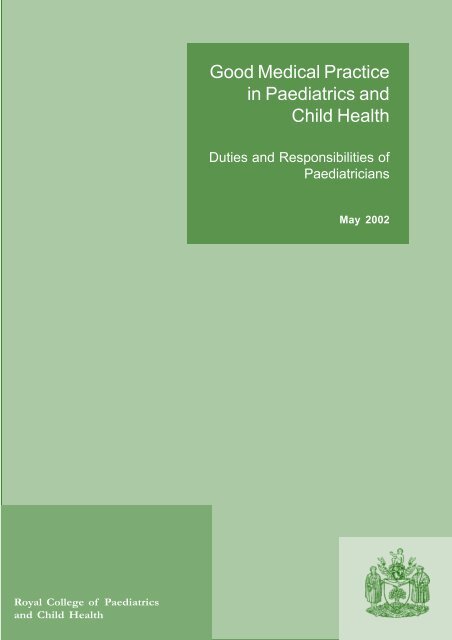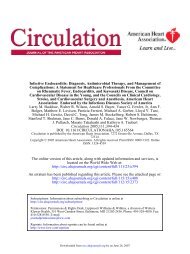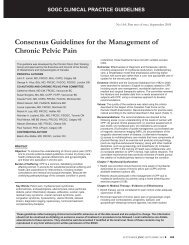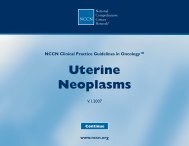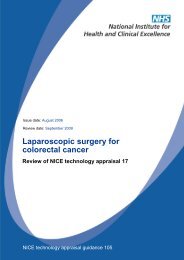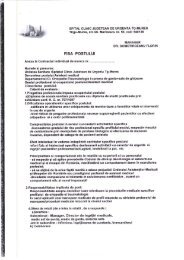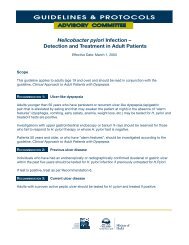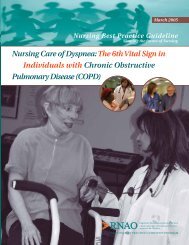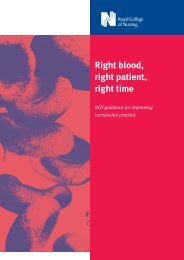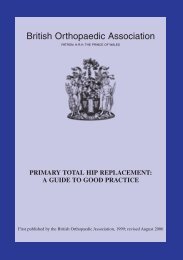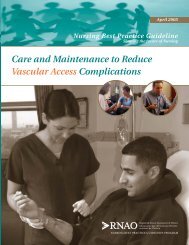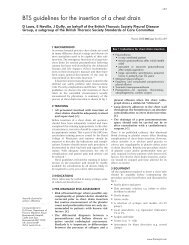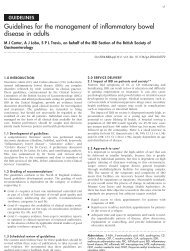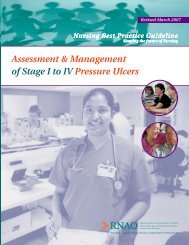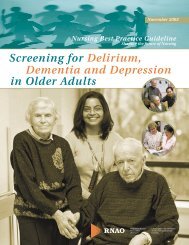Good Medical Practice in Paediatrics and Child Health
Good Medical Practice in Paediatrics and Child Health
Good Medical Practice in Paediatrics and Child Health
- No tags were found...
You also want an ePaper? Increase the reach of your titles
YUMPU automatically turns print PDFs into web optimized ePapers that Google loves.
<strong>Good</strong> <strong>Medical</strong> <strong>Practice</strong> - May 2002The duties of a doctor registered with the General <strong>Medical</strong>CouncilPatients <strong>and</strong> parents must be able to trust doctors with their lives <strong>and</strong> well be<strong>in</strong>g. To justifythat trust, we as a profession have a duty to ma<strong>in</strong>ta<strong>in</strong> a good st<strong>and</strong>ard of practice <strong>and</strong> care<strong>and</strong> to show respect for human life. In particular as a doctor you must: make the care of your patient your first concern; treat every patient <strong>and</strong> their family politely <strong>and</strong> considerately; respect patients’ dignity <strong>and</strong> privacy; listen to patients <strong>and</strong> parents <strong>and</strong> respect their views; give patients <strong>and</strong> parents <strong>in</strong>formation <strong>in</strong> a way they can underst<strong>and</strong>; respect the rights of patients <strong>and</strong> parents to be fully <strong>in</strong>volved <strong>in</strong> decisions about theircare; keep your professional knowledge <strong>and</strong> skills up to date; recognise the limits of your professional competence; be honest <strong>and</strong> trustworthy; respect <strong>and</strong> protect confidential <strong>in</strong>formation; make sure that your personal beliefs do not prejudice your patients’ care; act quickly to protect patients from risk if you have good reason to believe that youor a colleague may not be fit to practise; avoid abus<strong>in</strong>g your position as a doctor; <strong>and</strong> work with colleagues <strong>in</strong> the ways that best serve patients’ <strong>in</strong>terests.In all these matters you must never discrim<strong>in</strong>ate unfairly aga<strong>in</strong>st your patients, their familiesor colleagues. You must always be prepared to justify your actions to them.Paediatricians are expected to support the aims of the Charter 4 <strong>and</strong> Strategy 5 of the Royal College of<strong>Paediatrics</strong> <strong>and</strong> <strong>Child</strong> <strong>Health</strong> (RCPCH). These <strong>in</strong>clude: To advance the art <strong>and</strong> science of <strong>Paediatrics</strong> To raise the st<strong>and</strong>ards of medical care provided to children To educate <strong>and</strong> exam<strong>in</strong>e those concerned with the health of children To work with all health carers of children, with<strong>in</strong> <strong>and</strong> outside the health services, to improve thephysical, mental <strong>and</strong> emotional health of children <strong>and</strong> young people.The RCPCH has also published Duties of a Paedatrician 6 <strong>and</strong> these duties are referred to <strong>in</strong> thisdocument under the relevant sections.Duties <strong>and</strong> responsibilities of doctorsBe<strong>in</strong>g registered with the GMC gives you rights <strong>and</strong> privileges. In return you must fulfil the duties <strong>and</strong>responsibilities of a doctor set by the GMC. The pr<strong>in</strong>ciples of good paediatric practice <strong>and</strong> the st<strong>and</strong>ardsof conduct expected of you <strong>in</strong> all aspects of your professional work are described <strong>in</strong> this booklet.4
<strong>Good</strong> <strong>Medical</strong> <strong>Practice</strong> - May 2002<strong>Good</strong> <strong>Medical</strong> <strong>Practice</strong>1. All patients are entitled to good st<strong>and</strong>ards of practice <strong>and</strong> care from their doctors.Essential elements of this are professional competence; good relationships with patients<strong>and</strong> colleagues; <strong>and</strong> observance of professional ethical obligations.• Paediatricians should commit themselves to practise <strong>in</strong> accordance with the Objects ofthe College <strong>and</strong> the UN Convention on the Rights of the <strong>Child</strong> 1 .• Paediatricians, whatever their specialty <strong>in</strong>terest, should underst<strong>and</strong> their particularresponsibilities for the holistic <strong>and</strong> life-long health of children who come under their care:each contact is an opportunity for health promotion <strong>and</strong> disease prevention 6 .• The paediatrician must consider the family as well as the patient. <strong>Good</strong> practice dem<strong>and</strong>sparticular attention to communication <strong>and</strong> effective relationships with the patient’s family.5
<strong>Good</strong> <strong>Medical</strong> <strong>Practice</strong> - May 2002g. Prescribe drugs or treatment, <strong>in</strong>clud<strong>in</strong>g repeat prescriptions, only where you haveadequate knowledge of the patient’s health <strong>and</strong> medical needs. You must not give orrecommend to patients any <strong>in</strong>vestigation or treatment which you know is not <strong>in</strong>their best medical <strong>in</strong>terests or withhold appropriate treatments or referral.• Paediatricians should ensure that the parents <strong>and</strong> patient are appropriately <strong>in</strong>formedabout any drugs that are prescribed <strong>and</strong> the status of drugs used “off label” for children.The reasons why these are prescribed should be expla<strong>in</strong>ed <strong>and</strong> <strong>in</strong>formation leafletsshould be available.h. Report adverse drug reactions as required under the relevant report<strong>in</strong>g scheme,<strong>and</strong> co-operate with requests for <strong>in</strong>formation from organisations monitor<strong>in</strong>g thepublic health.i. Make efficient use of the resources available to you.• Paediatricians should be aware of expert guidance when prescrib<strong>in</strong>g new <strong>and</strong> expensivetherapies. Note should be taken of recommendations from Specialty Groups, NICE<strong>and</strong> other guidel<strong>in</strong>es.• Paediatricians should not prescribe unnecessarily expensive treatment.Unacceptable practice:• Undertak<strong>in</strong>g work known to be outside the <strong>in</strong>dividual’s area of competence, save for goodreason or <strong>in</strong> an emergency• Documentation that does not adequately describe patient care• Illegible patient records• Provision of treatments that are <strong>in</strong>consistent with best practice or evidence without goodreason• Provision of treatment that results <strong>in</strong> failure to obta<strong>in</strong> access to recognised proper management4. If you have good reason to th<strong>in</strong>k that your ability to treat patients safely is seriouslycompromised by <strong>in</strong>adequate premises, equipment, or other resources, you should put thematter right if that is possible. In all other cases you should draw the matter to theattention of your Trust, or other employ<strong>in</strong>g or contract<strong>in</strong>g body. You should record yourconcerns <strong>and</strong> the steps you have taken to try to resolve them.• Paediatricians should serve as advocates for the health needs of children locally, nationally<strong>and</strong> <strong>in</strong>ternationally 6 .• Paediatricians should press for adequate resources to provide their services <strong>and</strong> ensurethat managers are aware when these are not available.Decisions about access to medical care5. The <strong>in</strong>vestigations or treatment you provide or arrange must be based on yourcl<strong>in</strong>ical judgement of the patient’s needs <strong>and</strong> the likely effectiveness of the treatment.You must not allow your views about a patient’s lifestyle, culture, beliefs, race, colour,gender, sexuality, disability, age, or social or economic status, to prejudice the treatment8
<strong>Good</strong> <strong>Medical</strong> <strong>Practice</strong> - May 2002you provide or arrange. You must not refuse or delay treatment because you believe thatpatients’ actions have contributed to their condition.• Paediatricians should pay due regard to the domestic, sociological, environmental <strong>and</strong>genetic dimensions of the health of children 6 .• Paediatricians should be aware of religious <strong>and</strong> ethnic differences <strong>and</strong> be prepared toaccommodate these where this does not compromise the well-be<strong>in</strong>g of the child or youngperson. There are particular difficulties, for example, where permission for blood transfusionis withheld, <strong>and</strong> the paediatrician must be familiar with the ethical <strong>and</strong> legal pathways fordeal<strong>in</strong>g with this situation.• The <strong>in</strong>terests <strong>and</strong> well-be<strong>in</strong>g of the child should always be paramount.6. If you feel that your beliefs might affect the advice or treatment you provide, youmust expla<strong>in</strong> this to patients, <strong>and</strong> tell them of their right to see another doctor.7. You must try to give priority to the <strong>in</strong>vestigation <strong>and</strong> treatment of patients on thebasis of cl<strong>in</strong>ical need.8 You must not refuse to treat a patient because you may be putt<strong>in</strong>g yourself at risk. Butif patients pose a risk to your health or safety you should take reasonable steps to protectyourself before <strong>in</strong>vestigat<strong>in</strong>g their condition or provid<strong>in</strong>g treatmentUnacceptable practice:• Prejudicial behaviour that is distress<strong>in</strong>g to parents <strong>and</strong> families• Repeated preferential treatment of families, to the detriment of others, based on anyth<strong>in</strong>gother than cl<strong>in</strong>ical need <strong>and</strong> available treatmentTreatment <strong>in</strong> emergencies9 In an emergency, you must offer anyone at risk the treatment you could reasonably beexpected to provide.• Paediatricians who are on call must take all reasonable steps to ensure that they areimmediately contactable <strong>and</strong> readily available for emergencies or that an appropriatelyexperienced colleague can provide appropriate cover at a similar level of expertise.9
<strong>Good</strong> <strong>Medical</strong> <strong>Practice</strong> - May 2002Ma<strong>in</strong>ta<strong>in</strong><strong>in</strong>g good medical practiceKeep<strong>in</strong>g up to date10 You must keep your knowledge <strong>and</strong> skills up to date throughout your work<strong>in</strong>g life.In particular, you should take part regularly <strong>in</strong> educational activities that develop yourcompetence <strong>and</strong> performance.• Paediatricians have a responsibility to safeguard the reputation of paediatrics throughtheir personal cl<strong>in</strong>ical practice <strong>and</strong> through participation <strong>in</strong> cont<strong>in</strong>u<strong>in</strong>g professionaldevelopment, enabl<strong>in</strong>g them to ma<strong>in</strong>ta<strong>in</strong> <strong>and</strong> enhance their knowledge skills <strong>and</strong>competence for effective cl<strong>in</strong>ical practice to meet the needs of children 6 .• The College provides all members with a portfolio, which <strong>in</strong>cludes cards on which torecord cont<strong>in</strong>u<strong>in</strong>g professional development (CPD).• Paediatricians have a duty to rema<strong>in</strong> <strong>in</strong> good st<strong>and</strong><strong>in</strong>g with the College by undertak<strong>in</strong>gCPD activities appropriate to their practice <strong>and</strong> by record<strong>in</strong>g this with the recognisedprofessional body appropriate to their practice.11 Some parts of medical practice are governed by law or are regulated by other statutorybodies. You must observe <strong>and</strong> keep up to date with the laws <strong>and</strong> statutory codes of practicewhich affect your work.• Statutory duties 8,9 are particularly relevant to those who work <strong>in</strong> the areas of child protection,“looked after” children <strong>and</strong> child development. These paediatricians should haverelevant expertise <strong>in</strong> these duties <strong>and</strong> ensure that they are up to date.Ma<strong>in</strong>ta<strong>in</strong><strong>in</strong>g your performance12 You must work with colleagues to monitor <strong>and</strong> ma<strong>in</strong>ta<strong>in</strong> your awareness of thequality of the care you provide. In particular, you must:a. Take part <strong>in</strong> regular <strong>and</strong> systematic medical <strong>and</strong> cl<strong>in</strong>ical audit, record<strong>in</strong>g datahonestly. Where necessary you must respond to the results of audit to improve yourpractice, for example by undertak<strong>in</strong>g further tra<strong>in</strong><strong>in</strong>g.b. Respond constructively to the outcome of reviews, assessments or appraisals ofyour performance.• Assessment <strong>and</strong> appraisal should <strong>in</strong>clude review of performance aga<strong>in</strong>st the pr<strong>in</strong>ciplesset out <strong>in</strong> this document.c. Take part <strong>in</strong> confidential enquiries <strong>and</strong> critical <strong>in</strong>cident report<strong>in</strong>g.• Paediatricians have a particular duty to take part <strong>in</strong> relevant Confidential EnquiriesUnacceptable practice:• Failure to demonstrate any active <strong>in</strong>volvement <strong>in</strong> appropriate cont<strong>in</strong>u<strong>in</strong>g professionaldevelopment• Refusal to take any part <strong>in</strong> relevant audit or to respond to audit f<strong>in</strong>d<strong>in</strong>gs• Refusal to participate <strong>in</strong> or to make any response to appraisals10
Teach<strong>in</strong>g <strong>and</strong> tra<strong>in</strong><strong>in</strong>g, apprais<strong>in</strong>g <strong>and</strong> assess<strong>in</strong>gMak<strong>in</strong>g assessments <strong>and</strong> provid<strong>in</strong>g references<strong>Good</strong> <strong>Medical</strong> <strong>Practice</strong> - May 200213. You must be honest <strong>and</strong> objective when apprais<strong>in</strong>g or assess<strong>in</strong>g the performance ofany doctor <strong>in</strong>clud<strong>in</strong>g those you have supervised or tra<strong>in</strong>ed. Patients may be put at risk ifyou describe as competent someone who has not reached or ma<strong>in</strong>ta<strong>in</strong>ed a satisfactory st<strong>and</strong>ardof practice.• The Royal College has undertaken to provide guidance <strong>in</strong> the assessment of competencies<strong>and</strong>, where available, these should be followed.• Tra<strong>in</strong>ees should be assessed at the start of a tra<strong>in</strong><strong>in</strong>g post to ensure that they receiveappropriate supervision <strong>in</strong> tasks that they will be expected to perform.• Paediatricians or tra<strong>in</strong>ees who are not competent should be tra<strong>in</strong>ed <strong>and</strong> reassessed toensure that they have acquired appropriate skills.• Paediatricians responsible for assess<strong>in</strong>g tra<strong>in</strong>ees should undertake tra<strong>in</strong><strong>in</strong>g <strong>in</strong> the RITAprocess.• Paediatricians should take steps to ensure that measures are <strong>in</strong> place to check that locumshave appropriate references.• Non-consultant grade staff <strong>and</strong> locums also need supervision <strong>and</strong> support <strong>and</strong> should begiven the opportunity to participate <strong>in</strong> CPD.14. You must provide only honest <strong>and</strong> justifiable comments when giv<strong>in</strong>g references for,or writ<strong>in</strong>g reports about, colleagues. When provid<strong>in</strong>g references you must <strong>in</strong>clude allrelevant <strong>in</strong>formation which has a bear<strong>in</strong>g on your colleague’s competence, performance<strong>and</strong> conduct.• References should also <strong>in</strong>clude an <strong>in</strong>dication of the <strong>in</strong>dividual’s ability to work <strong>in</strong> a multidiscipl<strong>in</strong>aryteam <strong>and</strong> to communicate with families.Unacceptable practice:• Know<strong>in</strong>gly to provide a mislead<strong>in</strong>g assessment of a tra<strong>in</strong>ee’s performance• Know<strong>in</strong>gly to provide a mislead<strong>in</strong>g reference where there are concerns about competence,performance or conductTeach<strong>in</strong>g <strong>and</strong> tra<strong>in</strong><strong>in</strong>g15. You should be will<strong>in</strong>g to contribute to the education of students or colleagues.16. If you have special responsibilities for teach<strong>in</strong>g you must develop the skills, attitudes<strong>and</strong> practices of a competent teacher. You must also make sure that students <strong>and</strong> juniorcolleagues are properly supervised.• Particular care must be taken when supervis<strong>in</strong>g students <strong>and</strong> tra<strong>in</strong>ees <strong>in</strong> the care <strong>and</strong>management of children <strong>and</strong> young people.• Families should always be aware of the status of those <strong>in</strong>volved <strong>in</strong> the care of their child.11
<strong>Good</strong> <strong>Medical</strong> <strong>Practice</strong> - May 2002• Families should be given the opportunity to decl<strong>in</strong>e the presence of observers.• Those who teach should have completed a “Tra<strong>in</strong><strong>in</strong>g the Tra<strong>in</strong>ers” course or equivalent.• Tra<strong>in</strong>ees should receive tra<strong>in</strong><strong>in</strong>g <strong>in</strong> techniques of exam<strong>in</strong><strong>in</strong>g the adolescent, the youngchild <strong>and</strong> the newborn baby.• Every tra<strong>in</strong>ee should have an education contract <strong>and</strong> a consultant who is their educationalsupervisor. The tra<strong>in</strong>ee <strong>and</strong> the educational supervisor should endeavour to meetfor an appraisal 3 times <strong>in</strong> each 6-month period.Unacceptable practice:• Failure to deliver appropriate educational supervision if designated to do so <strong>and</strong> withoutgood reason• Permitt<strong>in</strong>g juniors to practice beyond their competence unless there is good reason or anemergency12
<strong>Good</strong> <strong>Medical</strong> <strong>Practice</strong> - May 2002Relationships with patientsObta<strong>in</strong><strong>in</strong>g consent17. You must respect the right of patients to be fully <strong>in</strong>volved <strong>in</strong> decisions about theircare. Wherever possible, you must be satisfied, before you provide treatment or <strong>in</strong>vestigatea patient’s condition, that the patient has understood what is proposed, <strong>and</strong> why, anysignificant risks or side effects associated with it <strong>and</strong> has given consent. You must read<strong>and</strong> follow the guidance <strong>in</strong> the GMC booklet Seek<strong>in</strong>g Patients’ Consent: The EthicalConsiderations.• This general obligation applies to paediatricians when the child old enough to underst<strong>and</strong>the nature, purpose <strong>and</strong> implications of the treatment.• Paediatricians must also <strong>in</strong>volve parents <strong>in</strong> the decisions when appropriate.• Written consent is not required for all <strong>in</strong>vestigations or treatments, but there must beclear guidel<strong>in</strong>es for those that do need such consent, <strong>and</strong> those that do not• The Department of <strong>Health</strong> consent forms must be used for obta<strong>in</strong><strong>in</strong>g consent for treatments<strong>and</strong> procedures. Paediatricians should be aware of the correct forms to usewhere children <strong>and</strong> parents are to give consent <strong>and</strong> for the circumstances under whichsuch consent is required.• In all cases the paediatrician must document discussions with the child <strong>and</strong>/or parents <strong>in</strong>the notes. It is good practice to be accompanied by a nurse dur<strong>in</strong>g these discussions.• Where the child is old enough to underst<strong>and</strong>, these discussions <strong>and</strong> the consent procedureshould <strong>in</strong>volve the child or young person.• Cont<strong>in</strong>u<strong>in</strong>g <strong>in</strong>formation must be given to the parents, <strong>and</strong> where appropriate the child,with opportunities to ask questions so that they are <strong>in</strong>volved <strong>and</strong> consent to the plan ofmanagement can be implicit.• Decisions about a child’s care where the parents disagree with medical advice must beh<strong>and</strong>led sensitively. In exceptional cases, for the safety <strong>and</strong> best <strong>in</strong>terests of the child orbaby, the medical team will not feel it appropriate to agree with the parents’ wishes.This must be h<strong>and</strong>led properly <strong>and</strong> must <strong>in</strong>volve due recourse to other bodies such ascl<strong>in</strong>ical ethics committees, social services, the police or the courts.• Consideration should be given to consult<strong>in</strong>g the medical defence organisations <strong>and</strong> thelegal profession.• Where withdrawal of treatment is contemplated this must be h<strong>and</strong>led <strong>in</strong> accordancewith the guidel<strong>in</strong>es produced by the RCPCH <strong>in</strong> Withdraw<strong>in</strong>g <strong>and</strong> Withhold<strong>in</strong>g Life-Sav<strong>in</strong>g Treatment <strong>in</strong> <strong>Child</strong>ren 10 .Unacceptable practice:• Failure to <strong>in</strong>volve the parents or carers – or where appropriate the child - <strong>in</strong> decisionsabout care, without good reason• Management of withdrawal of treatment without consideration of the RCPCH guidel<strong>in</strong>esRespect<strong>in</strong>g confidentiality18. You must treat <strong>in</strong>formation about patients as confidential. If <strong>in</strong> exceptionalcircumstances there are good reasons why you should pass on <strong>in</strong>formation without apatient’s consent, or aga<strong>in</strong>st a patient’s wishes, you must read <strong>and</strong> follow the GMCguidance on Confidentiality: Protect<strong>in</strong>g <strong>and</strong> Provid<strong>in</strong>g Information <strong>and</strong> be prepared tojustify your decision to the patient, if appropriate, <strong>and</strong> to the GMC <strong>and</strong> the courts, if13
<strong>Good</strong> <strong>Medical</strong> <strong>Practice</strong> - May 2002called on to do so.• Where possible, consent should be obta<strong>in</strong>ed from parents <strong>and</strong> from the child before any<strong>in</strong>formation about a patient is h<strong>and</strong>ed on to others.• Paediatricians should be aware of the circumstances surround<strong>in</strong>g the confidentiality ofscreen<strong>in</strong>g <strong>and</strong> rare disease registers on which the guidance is currently unclear.• Paediatricians must follow current guidel<strong>in</strong>es on consent <strong>and</strong> have local guidel<strong>in</strong>es <strong>in</strong>place where there is no central directive on obta<strong>in</strong><strong>in</strong>g consent for procedures on children.• Paediatricians should be aware of procedures <strong>in</strong> child protection where <strong>in</strong>formation maybe disclosed to a third party if it is <strong>in</strong> the child’s best <strong>in</strong>terest.The <strong>Child</strong>ren Act 8 makes itclear that the welfare of the child is paramount. Section 27 places a legal duty on anyhealth professional to assist social services <strong>and</strong> to notify them of children who may be atrisk of significant harm.Unacceptable practice:• Breaches of the GMC guidel<strong>in</strong>es where the decision cannot be justified or def<strong>in</strong>ed as be<strong>in</strong>g<strong>in</strong> the <strong>in</strong>terest of patient or publicMa<strong>in</strong>ta<strong>in</strong><strong>in</strong>g trust19. Successful relationships between doctors <strong>and</strong> patients depend on trust. To establish<strong>and</strong> ma<strong>in</strong>ta<strong>in</strong> that trust you must:a. Be polite <strong>and</strong> considerate;• Paediatricians should be courteous <strong>and</strong> compassionate <strong>in</strong> all their professional deal<strong>in</strong>gswith children, their parents <strong>and</strong> other carers, plac<strong>in</strong>g the child’s best <strong>in</strong>terests at thecentre of all cl<strong>in</strong>ical considerations 6 .• Paediatricians should clearly <strong>in</strong>troduce themselves to parents <strong>and</strong> children, giv<strong>in</strong>g theirname <strong>and</strong> status with<strong>in</strong> the team. They should have identification from the employ<strong>in</strong>gorganisation.• Paediatricians must appropriately manage distressed patients <strong>and</strong> families.b. Respect patients’ privacy <strong>and</strong> dignity;• Paediatricians should be aware that young children <strong>and</strong> babies also have a right to privacy.• Paediatricians should press for dedicated facilities for adolescents so that their privacy<strong>and</strong> dignity can be respected.• A private area should be used for confidential discussions with parents or children, particularlywhen bad news about a diagnosis or a prognosis must be given.c. Respect the right of patients to decl<strong>in</strong>e treatment or decl<strong>in</strong>e to take part <strong>in</strong> teach<strong>in</strong>gor research <strong>and</strong> ensure that their refusal does not adversely affect your relationshipwith them;• A child under 18 cannot, <strong>in</strong> Engl<strong>and</strong> <strong>and</strong> Wales, decl<strong>in</strong>e treatment aga<strong>in</strong>st the wishes ofthe parents <strong>and</strong> the advice of the doctor, nor can a parent decl<strong>in</strong>e treatment on behalf ofa child competent to give consent. Legal clarification of this may be advisable. In Scotl<strong>and</strong><strong>and</strong> Northern Irel<strong>and</strong> a competent child or young person can decl<strong>in</strong>e treatment.14
• Nevertheless they should not be expected to submit to treatment aga<strong>in</strong>st their will unlessthis is clearly <strong>in</strong> their best <strong>in</strong>terests.• Only rarely is it appropriate to compel a child over the age of 16 to accept a treatment onthe basis of parental consent.• Assent should be obta<strong>in</strong>ed where possible from children under the legal age for consent.• Where parents decl<strong>in</strong>e treatment for their child aga<strong>in</strong>st the advice of the doctor, legaladvice should be sought <strong>and</strong> action may be taken through the courts if appropriate.• The wishes of parents or children who decl<strong>in</strong>e to take part <strong>in</strong> research should always berespected.d. Respect the right of patients to a second op<strong>in</strong>ion;e. Be readily accessible to patients <strong>and</strong> colleagues when you are on duty.• A child or young person who is admitted acutely to hospital <strong>and</strong> who needs the op<strong>in</strong>ionof a tra<strong>in</strong>ed paediatrician, should be seen by a consultant or responsible non-consultantcareer grade doctor <strong>in</strong> a timely <strong>and</strong> appropriate way.• Tra<strong>in</strong>ees should be supported by an experienced <strong>and</strong> tra<strong>in</strong>ed colleague.20. You must not allow your personal relationships to underm<strong>in</strong>e the trust whichpatients place <strong>in</strong> you. In particular, you must not use your professional position to establishor pursue a sexual or improper emotional relationship with a patient or someone close tothem.Unacceptable practice:<strong>Good</strong> <strong>Medical</strong> <strong>Practice</strong> - May 2002• Failure to recognise or apologise for any discourtesy to patients or their carers• Denial of privacy where such provision could be made• Denial of reasonable access to a second op<strong>in</strong>ion• Failure to take reasonable steps to be available to see children as soon or as often asjudged necessary by other members of the team• Establish<strong>in</strong>g a personal relationship with the parent or other family member of childwhere this might affect the care offered to that child<strong>Good</strong> Communication21. <strong>Good</strong> communication between patients <strong>and</strong> doctors is essential to effective care<strong>and</strong> relationships of trust. <strong>Good</strong> communication <strong>in</strong>volves:a. Listen<strong>in</strong>g to patients <strong>and</strong> respect<strong>in</strong>g their views.• Paediatricians must listen to children <strong>and</strong> young people <strong>and</strong> respect their views.• Paediatricians should be aware of the legal position on differences of op<strong>in</strong>ion between achild <strong>and</strong> the parents, or the child or parents <strong>and</strong> the doctor, <strong>and</strong> be able to h<strong>and</strong>le thesesituations with sensitivity.• Paediatricians must be aware of the ethical issues surround<strong>in</strong>g the care of the <strong>in</strong>fant orchild with life threaten<strong>in</strong>g illness.b. Giv<strong>in</strong>g patients the <strong>in</strong>formation they ask for or need about their condition, itstreatment <strong>and</strong> prognosis <strong>in</strong> a way they can underst<strong>and</strong>, <strong>in</strong>clud<strong>in</strong>g, for any drug youprescribe, <strong>in</strong>formation about any serious side effects <strong>and</strong>, where appropriate, dosage.15
<strong>Good</strong> <strong>Medical</strong> <strong>Practice</strong> - May 2002• Paediatricians may have to break serious news to parents about their children, <strong>and</strong>sometimes to children or young people themselves, such as the diagnosis of malignant,disabl<strong>in</strong>g or genetic disease. Such news should only be given by an experienced cl<strong>in</strong>ician,usually a consultant.• Tra<strong>in</strong>ees need practical experience of break<strong>in</strong>g bad news as well as theoreticalconsiderations. Consultants should <strong>in</strong>volve tra<strong>in</strong>ees <strong>in</strong> these <strong>in</strong>terviews where possible<strong>and</strong> ensure that appropriate teach<strong>in</strong>g is given.• Interpreters <strong>and</strong> written <strong>in</strong>formation <strong>in</strong> relevant language should be available for familieswho may not underst<strong>and</strong> English. If possible, other family members should not be askedto <strong>in</strong>terpret <strong>in</strong> these situations.c. Shar<strong>in</strong>g <strong>in</strong>formation with patients’ partners, close relatives <strong>and</strong> carers, hav<strong>in</strong>gfirst obta<strong>in</strong>ed patients’ consent. When patients cannot give consent, you should sharethe <strong>in</strong>formation which those close to the patient need or want to know, except whereyou have reason to believe that the patient would object if able to do so. but wherepossible you should ask patients’ permission first.• Many young people under 16 are Gillick competent (see below) <strong>and</strong> can underst<strong>and</strong> <strong>and</strong>take or participate <strong>in</strong> decisions for themselves.• Paediatricians must recognise that some young people may not wish to share <strong>in</strong>formationwith their parents• A doctor may treat a Gillick competent young person without <strong>in</strong>form<strong>in</strong>g the parents if theyoung person so wishes, provid<strong>in</strong>g the conditions of maturity <strong>and</strong> underst<strong>and</strong><strong>in</strong>g are fulfilled.Gillick competentA child over the age of 16 has all the rights of an adult to consent to treatment, although the parentalright to consent on their behalf also cont<strong>in</strong>ues until they are 18. The child under 16 is able to consentto treatment provided that they are sufficiently mature to underst<strong>and</strong> the nature <strong>and</strong> purpose ofthe treatment.Such children are known as Gillick competent after a case <strong>in</strong> which it was held that a girl of14 or 15 was capable of consult<strong>in</strong>g a GP about contraception without the knowledge of her parents.The extent of Gillick competence clearly varies from child to child <strong>and</strong> the extent to which doctorsshould rely upon their consent varies with the nature of the treatment.22. If a patient under your care has suffered harm, through misadventure or for anyother reason, you should act immediately to put matters right, if that is possible. You mustexpla<strong>in</strong> fully <strong>and</strong> promptly to the patient what has happened <strong>and</strong> the likely long- <strong>and</strong>short-term effects. When appropriate you should offer an apology. If the patient is anadult who lacks capacity, the explanation should be given to a person with responsibilityfor the patient 1 , or the patient’s partner, close relative or a friend who has been <strong>in</strong>volved<strong>in</strong> the care of the patient, unless you have reason to believe the patient would have objectedto the disclosure. In the case of children the situation should be expla<strong>in</strong>ed honestly tothose with parental responsibility, <strong>and</strong> to the child, if the child has the maturity tounderst<strong>and</strong> the issues.• Paediatricians may be placed under difficult circumstances when car<strong>in</strong>g for a patientwhere other professionals have been <strong>in</strong>volved, for example, a newborn baby where thecompla<strong>in</strong>t may be made aga<strong>in</strong>st the obstetric team. The paediatrician should, whilst still1A person appo<strong>in</strong>ted under the Adults with Mental Incapacity Scotl<strong>and</strong> Act, 200016
e<strong>in</strong>g honest with the parents, conf<strong>in</strong>e the explanation to the areas of his or her ownexpertise.• Parents should be helped to ensure full <strong>and</strong> fair discussion takes place. Doctors have aresponsibility to take all appropriate steps to assure themselves <strong>and</strong> the family of thetruth of a situation.23. If a child has died you must expla<strong>in</strong>, to the best of your knowledge, the reasons for,<strong>and</strong> the circumstances of, the death to those with parental responsibility. Similarly, if anadult patient has died, you should provide this <strong>in</strong>formation to the patient’s partner, closerelative or a friend who has been <strong>in</strong>volved <strong>in</strong> the care of the patient, unless you havereason to believe that the patient would have objected.• The importance of obta<strong>in</strong><strong>in</strong>g an autopsy should be recognised. When seek<strong>in</strong>g consentfor an autopsy on a child or a baby an experienced paediatrician should undertake thisdiscussion with the parents, <strong>in</strong> l<strong>in</strong>e with national guidance.• Teach<strong>in</strong>g <strong>and</strong> experience <strong>in</strong> discuss<strong>in</strong>g the autopsy procedure <strong>and</strong> obta<strong>in</strong><strong>in</strong>g consentshould be given to all tra<strong>in</strong>ee paediatricians.• The autopsy itself should be carried out by an experienced paediatric or per<strong>in</strong>atal pathologist.Unacceptable practice:• Failure to listen appropriately to patients or carers or over-rid<strong>in</strong>g of any contrary viewswithout adequate reason or explanation• Failure to acknowledge an adverse <strong>in</strong>cident or cl<strong>in</strong>ical error, if you believe one has occurred.• Failure to offer an apology on behalf of your team, if a member has been at fault• Know<strong>in</strong>gly to provide a mislead<strong>in</strong>g account of events• Discourag<strong>in</strong>g further <strong>in</strong>vestigation of an adverse <strong>in</strong>cident contrary to the <strong>in</strong>terests of thefamily• Failure to take reasonable steps to ascerta<strong>in</strong> the correct details• Failure to take reasonable steps to identify or know<strong>in</strong>gly to fail to disclose an event that mayhave significantly contributed to a deathEnd<strong>in</strong>g professional relationships with patients<strong>Good</strong> <strong>Medical</strong> <strong>Practice</strong> - May 200224. Rarely, there may be circumstances, for example where a patient has been violentto you or a colleague, has stolen from the premises, or has persistently acted <strong>in</strong>consideratelyor unreasonably, <strong>in</strong> which the trust between you <strong>and</strong> the partner has been broken <strong>and</strong> youf<strong>in</strong>d it necessary to end a professional relationship with a patient. In such circumstances,you must be satisfied your decision is fair <strong>and</strong> does not contravene the guidance <strong>in</strong> paragraph6; you must be prepared to justify your decision if called on to do so. You should not endrelationships with patients solely because they have made a compla<strong>in</strong>t about you or yourteam, or because of the f<strong>in</strong>ancial impact of their care or treatment on your practice.25. You should <strong>in</strong>form the patient, orally or <strong>in</strong> writ<strong>in</strong>g, why you have decided to endthe professional relationship. You must also take steps to ensure that arrangements aremade quickly for the cont<strong>in</strong>u<strong>in</strong>g care of the patient, <strong>and</strong> h<strong>and</strong> over records to the patient’snew doctor as soon as possible.• Paediatricians may be forced to end a professional relationship with a family. They areunder the same obligation to act fairly <strong>and</strong> to ensure the cont<strong>in</strong>u<strong>in</strong>g care of the patient.17
<strong>Good</strong> <strong>Medical</strong> <strong>Practice</strong> - May 2002Deal<strong>in</strong>g with problems <strong>in</strong> professional practiceConduct or performance of colleagues26. You must protect patients from risk of harm posed by another doctor’s or otherhealth care professional’s conduct, performance or health, <strong>in</strong>clud<strong>in</strong>g problems aris<strong>in</strong>gfrom alcohol or other substance abuse. The safety of patients must come first at all times.Where there are serious concerns about a doctor’s performance, health or conduct, it isessential that steps be taken without delay to <strong>in</strong>vestigate the concerns to establish whetherthey are well founded, <strong>and</strong> to protect patients.27. If you have grounds to believe that a doctor or other healthcare professional maybe putt<strong>in</strong>g patients at risk, you must give an honest explanation of your concerns to anappropriate person from the employ<strong>in</strong>g authority, such as the medical director, nurs<strong>in</strong>gdirector or chief executive, or the director of public health or an officer of your localmedical committee, follow<strong>in</strong>g any procedures set by the employer. If there are no appropriatelocal systems or local systems cannot resolve the problem, <strong>and</strong> you rema<strong>in</strong> concerned aboutthe safety of patients, you should <strong>in</strong>form the relevant regulatory body. If you are not surewhat to do, discuss your concerns with an impartial colleague or contact your defencebody, a professional organisation or the GMC for advice.• The RCPCH has a process whereby <strong>in</strong>dependent peers can review situations where apaediatrician’s performance or conduct has been called <strong>in</strong>to question. This must neverbe a substitute for consideration by the GMC where this is necessary, but is used forsituations that need an <strong>in</strong>dependent assessment or mediation before serious trouble arises.• The National Cl<strong>in</strong>ical Assessment Authority will <strong>in</strong>teract with this group.• The College is also <strong>in</strong> the process of sett<strong>in</strong>g up a network of tra<strong>in</strong>ed mentors to providesupport to paediatricians who are the subjects of these processes.28. If you have management responsibilities you should, ensure that mechanisms are<strong>in</strong> place through which colleagues can raise concerns about risks to patients. Furtherguidance is provided <strong>in</strong> [the GMC] booklet Management <strong>in</strong> <strong>Health</strong> Care: The Role ofDoctors.Compla<strong>in</strong>ts <strong>and</strong> formal <strong>in</strong>quiries29. Patients who compla<strong>in</strong> about the care or treatment they have received have a rightto expect a prompt, open, constructive <strong>and</strong> honest response. You must not allow a patient’scompla<strong>in</strong>t to prejudice the care or treatment you provide or arrange for that patient.• Paediatricians should respond promptly to any compla<strong>in</strong>ts <strong>and</strong> participate <strong>in</strong> risk management<strong>and</strong> cl<strong>in</strong>ical governance procedures as may be set by the Trust with<strong>in</strong> which theywork.30. You must co-operate fully with any formal <strong>in</strong>quiry <strong>in</strong>to the treatment of a patient<strong>and</strong> with any compla<strong>in</strong>ts procedure which applies to your work. You must give, to thosewho are entitled to ask for it, any relevant <strong>in</strong>formation <strong>in</strong> connection with an <strong>in</strong>vestigation<strong>in</strong>to your own, or another health care professional’s conduct, performance or health.18
<strong>Good</strong> <strong>Medical</strong> <strong>Practice</strong> - May 2002Unacceptable practice:• Persistent failure to attempt to address the problem of a fail<strong>in</strong>g colleague.• Failure to cooperate with reasonable cl<strong>in</strong>ical governance procedures set by the employer.31. If you are suspended from a post or had restrictions put on your practice becauseof concerns about your performance or conduct, you must <strong>in</strong>form any other organisationsfor whom you undertake work of a similar nature. You must also <strong>in</strong>form any patients yousee <strong>in</strong>dependently of such organisations, if the treatment you provide is with<strong>in</strong> the area ofconcern relat<strong>in</strong>g to the suspension or restriction.32. Similarly, you must assist the coroner or procurator fiscal, by respond<strong>in</strong>g to<strong>in</strong>quiries, <strong>and</strong> by offer<strong>in</strong>g all relevant <strong>in</strong>formation to an <strong>in</strong>quest or <strong>in</strong>quiry <strong>in</strong>to a patient’sdeath. Only where your evidence may lead to crim<strong>in</strong>al proceed<strong>in</strong>gs be<strong>in</strong>g taken aga<strong>in</strong>styou are you entitled to rema<strong>in</strong> silent.• Paediatricians must be aware of the circumstances <strong>in</strong> which they should refer a death tothe coroner. The coroners’ requirements may vary from region to region.• Paediatricians should also be aware of the procedures to be undertaken when nonaccidentalor sudden unexpla<strong>in</strong>ed death occurs.Indemnity <strong>in</strong>surance33. In your own <strong>in</strong>terests, <strong>and</strong> those of your patients, you must obta<strong>in</strong> adequate<strong>in</strong>surance or professional <strong>in</strong>demnity cover for any part of your practice not covered by anemployer’s <strong>in</strong>demnity scheme.19
<strong>Good</strong> <strong>Medical</strong> <strong>Practice</strong> - May 2002Work<strong>in</strong>g with colleaguesTreat<strong>in</strong>g colleagues fairly34. You must always treat your colleagues fairly. In accordance with the law, you mustnot discrim<strong>in</strong>ate aga<strong>in</strong>st colleagues, <strong>in</strong>clud<strong>in</strong>g those apply<strong>in</strong>g for posts, on grounds oftheir sex, race or disability. And you must not allow your views of colleagues’ lifestyle,culture, beliefs, colour, gender, sexuality, or age to prejudice your professional relationshipwith them.35. You must not underm<strong>in</strong>e patients’ trust <strong>in</strong> the care or treatment they receive, or <strong>in</strong>the judgment of those treat<strong>in</strong>g them, by mak<strong>in</strong>g malicious or unfounded criticisms ofcolleagues.Unacceptable practice:• Prejudiced behaviour, bully<strong>in</strong>g or harassment of colleagues, <strong>in</strong>clud<strong>in</strong>g non-consultant careergrade doctors, tra<strong>in</strong>ees <strong>and</strong> colleagues <strong>in</strong> nurs<strong>in</strong>g, professions allied to medic<strong>in</strong>e or non healthcareworkersWork<strong>in</strong>g <strong>in</strong> teams36. <strong>Health</strong>care is <strong>in</strong>creas<strong>in</strong>gly provided by multi-discipl<strong>in</strong>ary teams. Work<strong>in</strong>g <strong>in</strong> a teamdoes not change your personal accountability for your professional conduct <strong>and</strong> the careyou provide. When work<strong>in</strong>g <strong>in</strong> a team you must:a. Respect the skills <strong>and</strong> contributions of your colleagues.b. Ma<strong>in</strong>ta<strong>in</strong> professional relationships with patientsc. Communicate effectively with colleagues with<strong>in</strong> <strong>and</strong> outside the team.d. Make sure that your patients <strong>and</strong> colleagues underst<strong>and</strong> your professional status <strong>and</strong>specialty, your role <strong>and</strong> responsibilities <strong>in</strong> the team <strong>and</strong> who is responsible for eachaspect of patients’ care.e. Participate <strong>in</strong> regular reviews <strong>and</strong> audit of the st<strong>and</strong>ards <strong>and</strong> performance of theteam, tak<strong>in</strong>g steps to remedy any deficiencies.f. Be will<strong>in</strong>g to deal openly <strong>and</strong> supportively with problems <strong>in</strong> the performance, conductor health of team members.• Almost all paediatricians work <strong>in</strong> multi-discipl<strong>in</strong>ary teams. In addition the roles of nurses<strong>and</strong> midwives are exp<strong>and</strong><strong>in</strong>g <strong>and</strong> there are now advanced nurse practitioners <strong>and</strong> nurseconsultants <strong>in</strong> most specialties. Paediatricians must work constructively with all membersof the team to build mutual respect <strong>and</strong> confidence.20
• Consultants should emphasise to tra<strong>in</strong>ees that some of their tra<strong>in</strong><strong>in</strong>g will be received frommembers of other discipl<strong>in</strong>es <strong>and</strong> that they should take advice from experienced nurses.• Paediatricians should clearly <strong>in</strong>troduce themselves to parents <strong>and</strong> children, giv<strong>in</strong>g theirname <strong>and</strong> position with<strong>in</strong> the team.• Paediatricians should be aware there may be a need to <strong>in</strong>volve specialists beyond thehospital <strong>in</strong>clud<strong>in</strong>g social workers or the police 11 .Lead<strong>in</strong>g teams37. If you lead a team, you must ensure that:a. <strong>Medical</strong> team members <strong>and</strong> the team meet the st<strong>and</strong>ards of conduct <strong>and</strong> care set<strong>in</strong> this guidance,b. Any problems that might prevent colleagues from other professions from follow<strong>in</strong>gguidance from their own regulatory bodies are brought to your attention <strong>and</strong>addressed.c. All team members underst<strong>and</strong> their personal <strong>and</strong> collective responsibility for thesafety of patients, <strong>and</strong> for openly <strong>and</strong> honestly record<strong>in</strong>g <strong>and</strong> discuss<strong>in</strong>g problems.d. Each patient’s care is properly co-ord<strong>in</strong>ated <strong>and</strong> managed <strong>and</strong> that patients knowwhom to contact if they have questions or concerns.e. Arrangements are <strong>in</strong> place to provide cover at all times.<strong>Good</strong> <strong>Medical</strong> <strong>Practice</strong> - May 2002f. Regular reviews <strong>and</strong> audit of the st<strong>and</strong>ards <strong>and</strong> performance of the team areundertaken <strong>and</strong> any deficiencies are addressed.g. Systems are <strong>in</strong> place for deal<strong>in</strong>g supportively with problems <strong>in</strong> the performance,conduct or health of team members.• Consultant paediatricians will lead the medical team but must recognise that there will beother leaders with<strong>in</strong> the multi-discipl<strong>in</strong>ary <strong>and</strong> management structure. There must begood communication <strong>and</strong> relationships with<strong>in</strong> this structure.• The relationship between junior tra<strong>in</strong>ees <strong>and</strong> experienced nurses must be sensitively h<strong>and</strong>led.• L<strong>in</strong>es of accountability must be clear with<strong>in</strong> the multi-discipl<strong>in</strong>ary team.38. Further advice on work<strong>in</strong>g <strong>in</strong> teams is provided <strong>in</strong> the GMC booklets Ma<strong>in</strong>ta<strong>in</strong><strong>in</strong>g<strong>Good</strong> <strong>Medical</strong> <strong>Practice</strong> <strong>and</strong> Management <strong>in</strong> <strong>Health</strong> Care - The Role of Doctors.Arrang<strong>in</strong>g cover39. You must be satisfied that, when you are off duty, suitable arrangements are madefor your patients’ medical care. These arrangements should <strong>in</strong>clude effective h<strong>and</strong>-overprocedures <strong>and</strong> clear communication between doctors.40. If you arrange cover for your own practice you must satisfy yourself that doctorswho st<strong>and</strong> <strong>in</strong> for you have the qualifications, experience, knowledge <strong>and</strong> skills to performthe duties for which they will be responsible. Deputis<strong>in</strong>g doctors <strong>and</strong> locums are directly21
<strong>Good</strong> <strong>Medical</strong> <strong>Practice</strong> - May 2002References1. <strong>Good</strong> <strong>Medical</strong> <strong>Practice</strong>. General <strong>Medical</strong> Council 2001.2. Ma<strong>in</strong>ta<strong>in</strong><strong>in</strong>g <strong>Good</strong> <strong>Medical</strong> <strong>Practice</strong>. General <strong>Medical</strong> Council 1998.3. Consultants’ Contracts: Annual Appraisal for Consultants. Department of <strong>Health</strong>AL(MD) 5/01 [http://www.doh.gov.uk/nhsexec/consultantappraisal]4. Royal Charter See: Royal College of <strong>Paediatrics</strong> <strong>and</strong> <strong>Child</strong> <strong>Health</strong> H<strong>and</strong>book.5. <strong>Child</strong> <strong>Health</strong> Strategy –A <strong>Child</strong>ren’s <strong>Health</strong> Service Royal College of <strong>Paediatrics</strong> <strong>and</strong><strong>Child</strong> <strong>Health</strong> 1998.6. Duties of a Paediatrician Royal College of <strong>Paediatrics</strong> <strong>and</strong> <strong>Child</strong> <strong>Health</strong> 1998.7. The UN Convention on the Rights of the <strong>Child</strong>.8. The <strong>Child</strong>ren Act, 1989.9. Work<strong>in</strong>g Together to Safeguard <strong>Child</strong>ren. Department of <strong>Health</strong>, 1999.10. Withdraw<strong>in</strong>g <strong>and</strong> Withhold<strong>in</strong>g Treatment <strong>in</strong> <strong>Child</strong>ren Royal College of <strong>Paediatrics</strong> <strong>and</strong><strong>Child</strong> <strong>Health</strong> 1998.11. Fabricated <strong>and</strong> Induced Illness. RCPCH, 2002.12. Guidel<strong>in</strong>es for the Ethical Conduct of <strong>Medical</strong> Research <strong>in</strong>volv<strong>in</strong>g <strong>Child</strong>ren. RoyalCollege of <strong>Paediatrics</strong> <strong>and</strong> <strong>Child</strong> <strong>Health</strong> 2000.13. Safeguard<strong>in</strong>g <strong>in</strong>formed parental <strong>in</strong>volvement <strong>in</strong> cl<strong>in</strong>ical research <strong>in</strong>volv<strong>in</strong>g newbornbabies <strong>and</strong> <strong>in</strong>fants. Royal College of <strong>Paediatrics</strong> <strong>and</strong> <strong>Child</strong> <strong>Health</strong> 1999.14. Commercial Sponsorship <strong>in</strong> the RCPCH Royal College of <strong>Paediatrics</strong> <strong>and</strong> <strong>Child</strong> <strong>Health</strong>1999.28
<strong>Good</strong> <strong>Medical</strong> <strong>Practice</strong> - May 2002AppendixSuggested support<strong>in</strong>g evidence useful for appraisal <strong>and</strong>revalidation purposes<strong>Good</strong> cl<strong>in</strong>ical careProvid<strong>in</strong>g a good st<strong>and</strong>ard of practice <strong>and</strong> careMRCPCH/DCH exam<strong>in</strong>ation <strong>and</strong> CCST certificatesRecognised guidel<strong>in</strong>es used <strong>in</strong> practiceRout<strong>in</strong>e <strong>in</strong>dicators of st<strong>and</strong>ards of care aimed for <strong>and</strong> metCertification from relevant <strong>and</strong> appropriately recent resuscitation courseExample of appropriate referral to another practitionerAnnual caseloadResults of cl<strong>in</strong>ical outcomes as compared to national figures, where available.Outcome of external peer review - formal or <strong>in</strong>formal.Details of colleagues regularly consultedEvidence of attendance at multidiscipl<strong>in</strong>ary meet<strong>in</strong>gsRecent audit dataExamples of outpatient lettersCopies of letters sent to managers draw<strong>in</strong>g attention to resource shortfallsMa<strong>in</strong>ta<strong>in</strong><strong>in</strong>g good medical practiceRCPCH portfolio <strong>and</strong> CPD po<strong>in</strong>tsCertificates of attendance at courses/study daysParticipation <strong>in</strong> distance based learn<strong>in</strong>gTimetable of participation <strong>in</strong> local sessionsEvidence of reflective learn<strong>in</strong>gEvidence of educational material accessed (e.g. journals, websites)Up to date audit data <strong>and</strong> methodologyRecord of how audit has changed practiceRecord of attendance at audit meet<strong>in</strong>gsRecord of appraisal <strong>and</strong> personal development planParticipation <strong>in</strong> local or national report<strong>in</strong>g <strong>and</strong> Confidential EnquiriesRecords of any critical <strong>in</strong>cident reports <strong>and</strong> action taken as a resultTeach<strong>in</strong>g <strong>and</strong> tra<strong>in</strong><strong>in</strong>g, apprais<strong>in</strong>g <strong>and</strong> assess<strong>in</strong>gAnonymised example of a reference providedRecords of participation <strong>in</strong> student teach<strong>in</strong>gRecords of attendance at educational meet<strong>in</strong>gsCertificate of teach<strong>in</strong>g or tra<strong>in</strong><strong>in</strong>g courseTeach<strong>in</strong>g timetable29
<strong>Good</strong> <strong>Medical</strong> <strong>Practice</strong> - May 2002Anonymised example of record of tra<strong>in</strong>ee appraisal/assessmentRecord of number of tra<strong>in</strong>ee assessments performedRecorded feedback from those taughtRelationships with patientsExamples of written <strong>in</strong>formation for parents on care providedExamples of written <strong>in</strong>formation on <strong>and</strong>, where appropriate, consent forms for practicalproceduresExamples of good practiceLetters of appreciation from parents or patients.Results of patient surveysDeal<strong>in</strong>g with problems <strong>in</strong> professional practiceOutcome of result of critical <strong>in</strong>cident <strong>in</strong>vestigationsAction taken as a resultLocal cl<strong>in</strong>ical governance arrangementsAction taken as a result of compla<strong>in</strong>tsDetails of any upheld compla<strong>in</strong>ts with copies of relevant responseWork<strong>in</strong>g with colleaguesDetails of regular team meet<strong>in</strong>gsStructured feedback from other team members, <strong>in</strong>clud<strong>in</strong>g tra<strong>in</strong>ees <strong>and</strong> non-medical colleaguesPeer questionnairesDetails of multi-discipl<strong>in</strong>ary meet<strong>in</strong>gsExample of GP letter <strong>and</strong> discharge summaryResearchCopy of ethical approval for any researchExample of consent form30
Royal College of <strong>Paediatrics</strong> <strong>and</strong> <strong>Child</strong> <strong>Health</strong>http://www.rcpch.ac.uk50 Hallam Street, London W1W 6DETelephone: 020 7307 5600 Fax: 020 7307 5601Registered Charity 1057744


